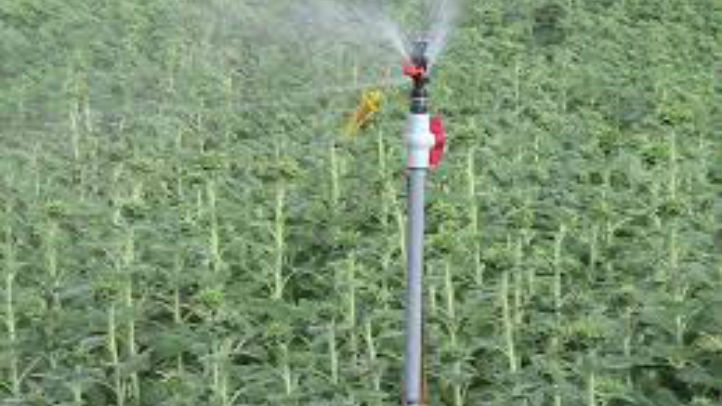 The GOI has formulated a new scheme i.e.“ National Mission for Sustainable Agriculture ” (NMSA) by converging, consolidating and subsuming all ongoing as well as newly proposed programmes related to sustainable agriculture including National Mission on Micro Irrigation (NMMI) with a special emphasis on soil and water conservation , water use efficiency, soil health management and rainfed area development.
The GOI has formulated a new scheme i.e.“ National Mission for Sustainable Agriculture ” (NMSA) by converging, consolidating and subsuming all ongoing as well as newly proposed programmes related to sustainable agriculture including National Mission on Micro Irrigation (NMMI) with a special emphasis on soil and water conservation , water use efficiency, soil health management and rainfed area development.
Out of the 4 components of NMSA, On Farm Water Management (OFWM) deals with Micro Irrigation, and is dealt by MIP, Horticulture Department. The components under OFWM are:
- Drip irrigation for wide spaced crops (Online)
- Drip irrigation for closed spaced crops (Inline).
- Micro sprinkler
- Mini sprinkler
- Sprinkler systems
- Portable
- Semi permanent
- Rain guns
SEN [Social Entrepreneur Network] would like to help NGOs to be able to reach out to the farmers. We are looking at catalyzing the implementation of this government scheme to help farmers in drier areas with drip irrigation to improve yields.
Salient points
- The govt gives between 90-100% subsidy for farmers who grow certain crops to establish thedrip irrigation
- This unfortunately has not succeeded well in the implementation due to various reasons.
- We are presently working on identifying a lead NGO at the state level and 10 NGOs to coordinate efforts in each district.
- These NGOs might directly work with the farmers or coordinate efforts with local NGOs at the mandal level.
- A pilot of 1000 farmers will be undertaken once the NGOs begin participation.
- This will be @ 100 farmers per district, which is an achievable target.
- We estimate an outflow of INR 5000 cr @ 1000 cr per year for the next five years to be able to get about half of Telengana farmers to usedrip irrigation.
The need cannot be highlighted, given the irregular monsoons over the past 3-4 years and the virtually failed monsoon this year, with low prospects of sufficient rainfall in the next 2-3 years.
Expected Results
Our efforts is expected to achieve the following results,
- Govt will be able to more effectively implement its scheme which is farmer friendly.
- NGOs will collaborate with each other and the govt machinery in an organized manner.
- A lot of farmers who would other wise not be able to grow anything and work as laborers or starve, would have a livelihood.
- Spiraling food prices will come down, giving relief to the home makers.
- Utilizing the student energy to help the farmers, many of whom might be children of farmers.
Given that Telengana is the youngest state in India, this effort will make an immense difference at a critical time. We would also like to extend this in the AP state.
The team
- Our champion, Mr. Salim David, a former CEO at an MNC, who has identified this need, implemented this in his own farm as well as 12 farmers in the same and also contributed articles which have been printed in Indian and foreign newspapers will provide direction.
- One lead NGO, who will coordinate, motivate and support district level NGOs. Our lead NGO has done good work with drinking water supply in rural areas, livelihood training like tailoring for women, establishing a temple, etc.
- One technical lead NGO, who will support the NGOs technically with the resources and knowhow required.
- 3 District level NGOs who will work on the pilot and also identify mandal level NGOs to work with.
The Need and Roles
- We strongly feel the need for a technical NGO to support this initiative at the state level. The technical NGO would simply need be the goto people to provide answers to technical queries and otherwise support NGOs and farmers in making this a success.
- 7 District level NGOs with interest in farmers. The logistics of gathering farmers and working with them would be played by the participating NGOs. They would coordinate with the NGOs at the mandal level and report in to the Lead NGO. In order for these NGOs to understand and support at the mandal level, they would take full responsibility of implementing the pilot and identify 100 suitable farmers.
- 10 Student interns per district with areas of study involving technical, management and agriculture.
- We are still looking out for the ideal Program manager.
Resources Available
The links below have the following details,
- An application form for the farmers loaded, which can be filled by the NGO.
- Relevant govt booklet.
- An article published in the media.
- A draft presentation
- Expected NGO, student and other participation.
Pls do share your thoughts as comments below. We look forward to seeing an active participation of all residents of the new states, which will make an irreplaceable difference.

